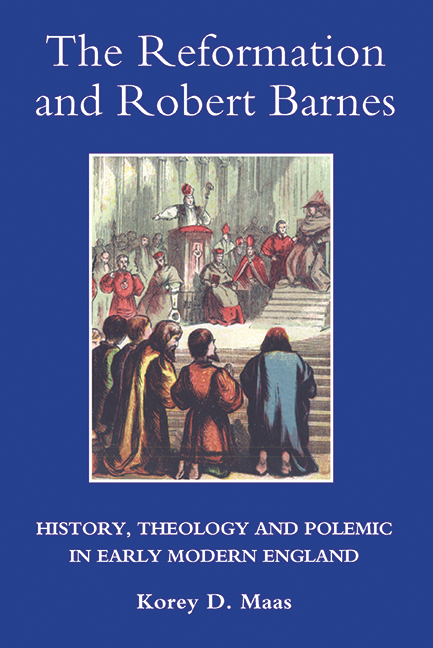Book contents
- Frontmatter
- Contents
- Dedication
- Acknowledgments
- Abbreviations and short titles
- Introduction
- Part I The Life and Theology of Robert Barnes
- Part II Barnes's Programme: History, Theology, and Polemic
- 3 History in Theology: Sentenciae and Supplications
- 4 Theology in History: Vitae Romanorum Pontificum (1536)
- 5 The Historical-Theological Programme of Robert Barnes
- Part III The Reception and Revision of Barnes's Programme
- Bibliography
- Index
- Miscellaneous Endmatter
3 - History in Theology: Sentenciae and Supplications
from Part II - Barnes's Programme: History, Theology, and Polemic
Published online by Cambridge University Press: 11 May 2017
- Frontmatter
- Contents
- Dedication
- Acknowledgments
- Abbreviations and short titles
- Introduction
- Part I The Life and Theology of Robert Barnes
- Part II Barnes's Programme: History, Theology, and Polemic
- 3 History in Theology: Sentenciae and Supplications
- 4 Theology in History: Vitae Romanorum Pontificum (1536)
- 5 The Historical-Theological Programme of Robert Barnes
- Part III The Reception and Revision of Barnes's Programme
- Bibliography
- Index
- Miscellaneous Endmatter
Summary
Historians of the early reformation in England have long noted the manner in which history was called upon to bolster the Crown's case for independence from Rome. Few, for example, fail to reference the 1533 Act in Restraint of Appeals and its mention of ‘divers sundry old authentic histories and chronicles’. It is this use of history for political ends which has most often been noted; and indeed, F.J. Levy seems to speak for many when he writes that ‘the use of history during the early period of the English Reformation was essentially secular, simply because, in the eyes of the government, matters of theology were not at issue’. While it has been more recently argued that matters of theology were very much at issue for the Henrician government, any detailed investigation of history's employment in these matters has yet to be made. The argument of this and the following chapters, however, will be that Robert Barnes made just such a use of historical argumentation.
On the evidence of his early biography one might assume that Barnes would naturally be disposed to a programme of theological reform based on an appeal to historical sources. The academic leanings evident in his reform of the Cambridge Austin friary clearly point to an interest in both the sources and methods of contemporary humanism. Though it is impossible to say how wholeheartedly or how consistently he embraced the studia humanitatis in the 1520s, it is probable that even at this stage he shared the renewed interest in history that was common to most humanist curricula. And indeed, unlike Luther, who at the imperial diet of Worms vowed to stand on the evidence of Scripture and conscience, Barnes claimed that at his own trial in 1526 he could not modify his confession because he had not been proved a heretic ‘by godes worde nor by holy doctours’. This certainly cannot be read as an unqualified acceptance of patristic authority; but it does betray his early willingness to give at least some weight to extra-biblical historical sources. And the willingness to weave such authorities into the source and substance of his theology was to become only more evident in later years.
- Type
- Chapter
- Information
- The Reformation and Robert BarnesHistory, Theology and Polemic in Early Modern England, pp. 71 - 106Publisher: Boydell & BrewerPrint publication year: 2010

